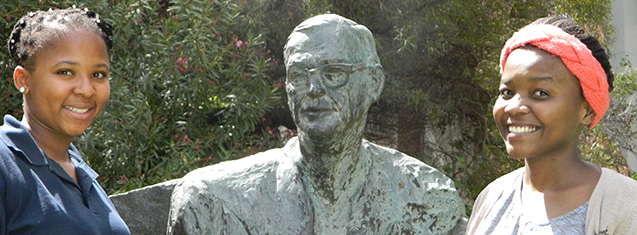Latest News Archive
Please select Category, Year, and then Month to display items
05 June 2018
Photo Supplied
 Archaeological excavations in the Wonderwerk Cave, north of Kuruman in the Northern Cape.
Archaeological excavations in the Wonderwerk Cave, north of Kuruman in the Northern Cape.
Research fellow Dr Lloyd Rossouw from the Department of Plant Sciences at the University of the Free State (UFS) recently published an article in the Nature Ecology and Evolution journal with Dr Michaela Ecker from the University of Toronto as lead author, and Dr James Brink, research fellow at the UFS Centre for Environmental Management. The findings described in “The palaeoecological context of the Oldowan-Acheulean in southern Africa” provides the first extensive paleoenvironmental sequence for the interior of southern Africa by applying a combination of methods for environmental reconstruction at Wonderwerk Cave, which have yielded multiple evidence of early human occupation dating back almost two million years ago.
Where water once was
The Wonderwerk Cave is found north of the Kuruman hills (situated in Northern Cape) a 140m long tube with a low ceiling. The surroundings are harsh. Semi-arid conditions allow for the survival of only hardy bushes, trees, and grasses. But during the Early Pleistocene, stepping out of the Wonderwerk Cave you would have been greeted by a completely different site, the researchers found. Using carbon and oxygen stable isotope analysis on the teeth of herbivores (Dr Ecker), fossil faunal abundance (Dr Brink), as well as the analysis of microscopic plant silica remains (phytoliths) excavated from fossil soils inside the cave (Dr Rossouw), the results show that ancient environments in the central interior of southern Africa were significantly wetter and housed a plant community unlike any other in the modern African savanna.
What difference does it make?
While East African research shows increasing aridity and the spread of summer-rainfall grasslands more than a million years ago, the results from this study indicate an interesting twist. During the same period, shifts in rainfall seasonality allowed for alternating summer and winter-rainfall grass occurrences coupled with prolonged wetlands, that remained major components of Early Pleistocene (more or less the period between one and two million years ago) environments in the central interior of southern Africa. That means our human ancestors were also living and evolving in environments other than the generally accepted open, arid grassland model.
Kovsies among top SADC debaters
2014-11-26

From the left are: Matlhodi Leteane and Lehakoe Masedi.
The UFS Debate Society is definitely not all talk and no action. They ranked 10th at the Southern African Development Community (SADC) Debate Open held in Gaborone, Botswana, from 14 – 16 November 2014.
Kovsie students Lehakoe Masedi (second-year BCom Law) and Matlhodi Leteane (first-year LLB Law) teamed up to represent our university at the prestigious SADC event hosted by the University of Botswana Speaking Union. Eight Southern African countries were represented as well as six universities from South Africa.
“Attending a tournament focused on the debating of regional issues and solutions was a great reward and we wish to take part in more of these tournaments in future,” says Lehakoe.
Out of a pool of 40 of the best individual speakers in Southern Africa, Lehakoe and Matlhodi were jointly awarded 18th place.
“Debate continues to help the growth of the student community and the attendance of such debate tournaments lends a lot of help to the internal growth of not only our partnership but our debate society as a whole,” says Lehakoe. “We take great pride in our performance, especially as first-year *British Parliamentary speakers. We wish to improve and grow as we progress further in our debate careers.”
*British Parliametary speaking is the style of debating used by university institutions.